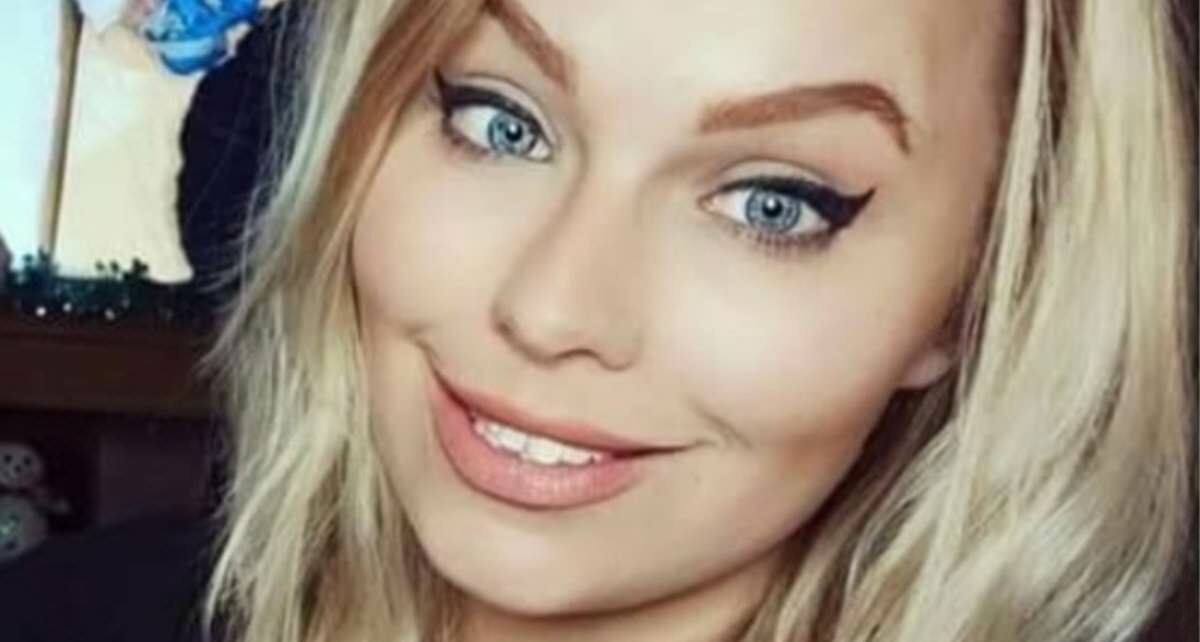Mother, 29, found dead at home with her two-year-old daughter lying on her chest saying ‘mummy won’t wake up’ died after ‘gross failures’ in care when ambulance crew missed signs of a heart attack, inquest rules
- Two paramedics visited Lauren Page Smith, 29, hours before a fatal heart attack
A coroner has found ‘gross failures’ in the care of a mother found dead at her home with her toddler trying to rouse her – just hours after paramedics were sent out to her.
Lauren Page Smith, 29, was discovered lying on the floor with her two-year-old daughter lying on her chest saying ‘mummy won’t wake up’.
There was a ‘clear sign’ of a cardiac event in progress, coroner Jo Lees said, when two paramedics were called out because the patient had been vomiting and had a sore throat.
Upon arrival, the ambulance crew were told the patient was suffering from chest pains – but reported no concerns after carrying out an electrocardiogram (ECG) test to check Lauren’s heart rhythm and electrical activity.
Ms Lees, area coroner for the Black Country, told the inquest it was likely this had affected Lauren’s decision not to attend hospital and there had been ‘gross failures’ in her care.
A post-mortem examination showed that Lauren died because of a sudden heart attack following a blood clot in the lung.
Lauren (pictured) had called 111 for advice and paramedics who arrived at her home and performed brief assessments
Pictured: Lauren with her two-year-old daughter before her death. Her mother said ‘Lauren had her whole life in front of her’
Lauren Page Smith (pictured), 29, was found at her house in Wolverhampton by her mother in January, lying on the floor with her two-year-old daughter on her chest
READ MORE: DENTAL RECEPTIONIST, 21, DIED AFTER TAKING MEDICATION TO HELP HER SLEEP
However, Ms Lees also said there was not enough evidence to suggest she would have survived had the ECG results been read correctly.
The coroner said she was unable to reach a finding of neglect but, delivering a narrative conclusion, noted Lauren’s abnormal ECG reading was incorrectly interpreted.
Ms Lees said the interpretation of ECG tests was a fundamental part of the job for paramedics but there were three abnormal indicators which had been missed.
Ahead of the inquest at Black Country Coroner’s Court, lawyers for the family told MailOnline the two paramedics had ‘a significant gap in their training’.
They spoke out after West Midland Ambulance Service’s (WMAS) own investigation found clinicians felt ‘falsely reassured’ that Lauren’s condition was ‘not overly concerning’ because of how old she was and that she appeared to be fine.
Her calm demeanour meant that medical staff did not believe the pain score she gave them, the report found.
The report concluded that the discharge was not safe or appropriate and that the clinicians ‘conveyed incomplete information to the 111 service about Lauren’s condition’.
At the inquest yesterday, Ms Lees raised concerns surrounding training at WMAS and said she would be outlining them in a prevention of future deaths report, which the ambulance service will be forced to respond to.
Law firm FBC Manby Bowdler, who are representing the Smith family, said they were worried West Midlands Ambulance Service paramedics misinterpreted Lauren’s ECG readings and told her she was fine instead of taking her to hospital. (File image)
She said she would also be reporting the two paramedics who had attended the scene to The Health and Care Professions Council.
The inquest heard that Lauren’s mother Emma Carrington had found her daughter lying on the floor at her apartment in Wolverhampton on January 6.
The court heard the paramedics had been dispatched to the young mother’s home following a 111 call for advice.
Ambulance technician Jodie Hardwick and her senior colleague and paramedic Laura Smith carried out an ECG test. But they misinterpreted the results and failed to spot the signs from an auto diagnostic monitor of ‘abnormal findings for an 18-39 female’.
READ MORE: FAMILY WINS BATTLE FOR FULL INQUEST INTO NHS DEATH OF WOMAN, 31, LEFT IN A&E CORRIDOR FOR 12 HOURS
Ms Hardwick said when she read her ECG results she saw nothing to give her cause for concern and told Lauren she couldn’t explain her symptoms, advising her to go to hospital for further tests.
But she said that Lauren had declined.
Ms Hardwick said: ‘When I advised her to go she said she saw on the news how busy hospitals were.
‘I got the general impression she didn’t feel like she needed to go.’
Ms Smith told the inquest she had applied the ECG leads and said there were ‘no clear issues’.
Matthew Ward, a consultant paramedic and head of clinical practice at WMAS, later reviewed the ECG reading and said it had been abnormal and warranted further investigation.
Both paramedics claimed they had not fully interpreted the ECG reading as there were certain indicators they had not been trained to look out for.
However, WMAS patient safety learning lead Eleanor Ball disputed this at the inquest.
She could not answer if the ambulance service had identified whether both paramedics required additional training following the incident, but said clinicians could contact the training department for further training if it was something they felt was needed.
The court in Oldbury, West Midlands, heard that when Ms Carrington later arrived at the address she tried to revive Lauren with CPR.
In a statement read by the coroner, the bereaved mother said she couldn’t explain the pain she felt and to know Lauren’s daughter would grow up without a mother was ‘heartbreaking’.
Speaking after the conclusion of the inquest, Ms Carrington said her ‘beautiful daughter’ had been ‘let down by two paramedics’.
Michael Portman-Hann, an associate at the law firm representing the Smith family, told MailOnline last week that ‘thorough’ improvements were needed to prevent a repeat of the ‘truly tragic case’.
The lawyer at FBC Manby Bowdler said: ‘The conclusions of the (WMAS) investigation demonstrate that Lauren’s symptoms were not appreciated and the paramedics were falsely reassured, but also that there was a significant gap in their training and skill set.
‘Lauren’s family and I have a number of concerns about the care which Lauren received, but also about the wider implications for future patients of the Ambulance Service.
‘The Service recognise that improvements need to be made, and it is really important for us that these are implemented thoroughly, competently and swiftly to ensure that no more avoidable deaths occur under their care.’
Ahead of the inquest, WMAS apologised to the Smith family and said it was ‘determined to do everything possible to try and stop something like this ever happening again.’
Source: Read Full Article






